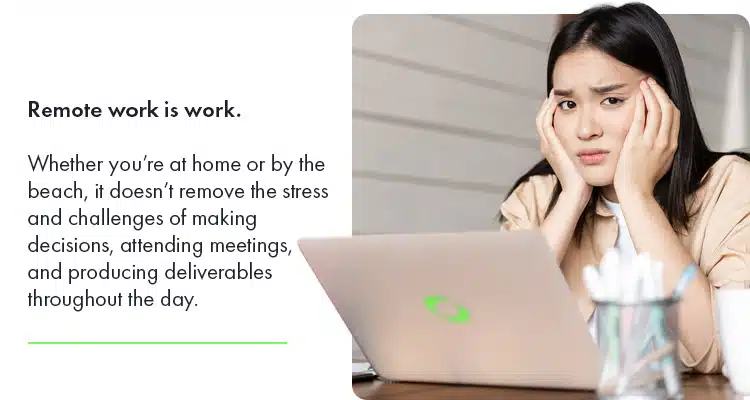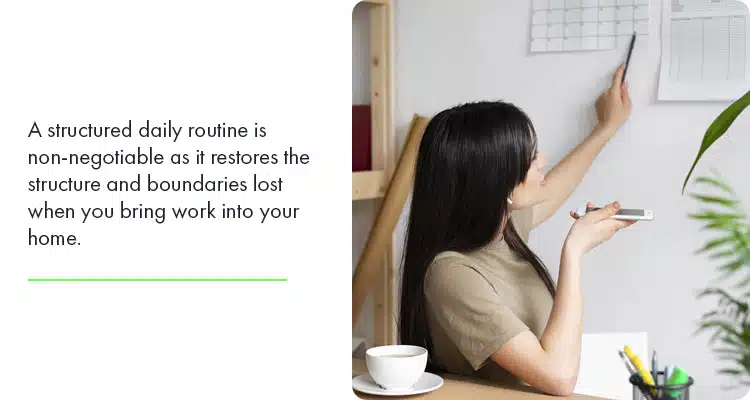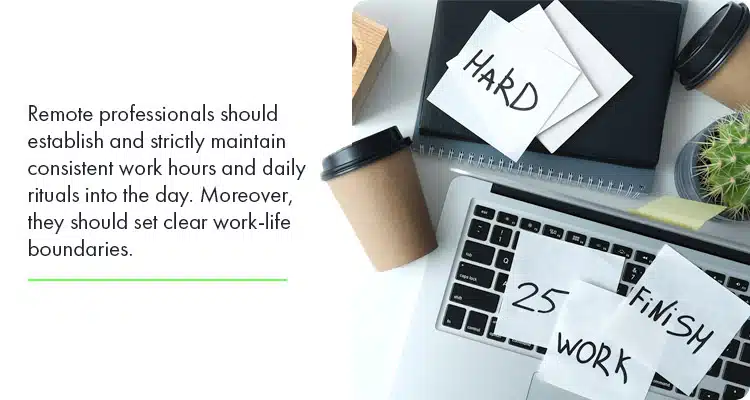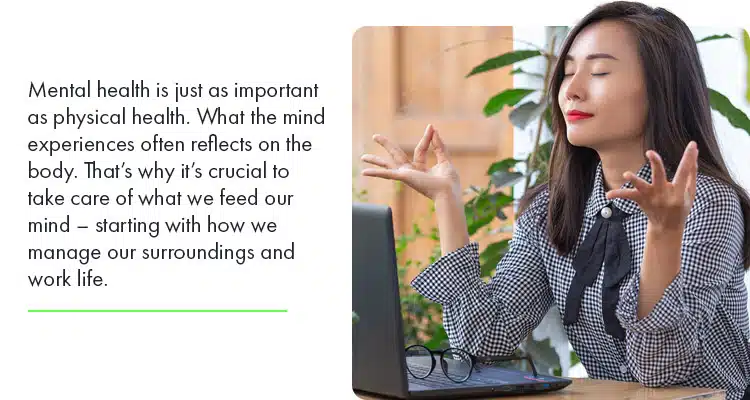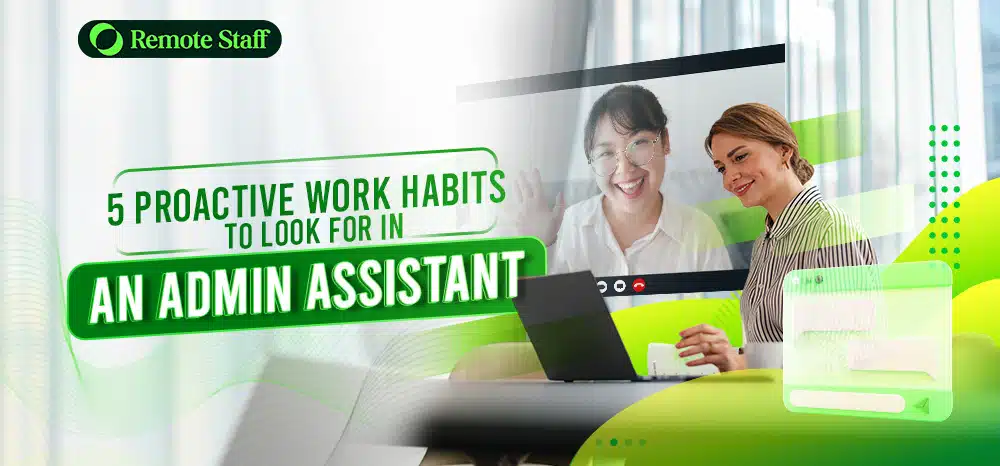Earning a living once meant being stuck in office cubicles and missing out on life.
Today, it can mean working on your goals without having to miss out on important moments like traveling or spending time at home with loved ones.
However, working remotely without the right systems in place can also feel isolating. With the line between work and home blurred, many find themselves continuing to work even after hours, which can lead to stress or burnout.
In this article, we’ll explore how remote professionals can make the most of remote work without burning out – especially as we celebrate Mental Health Month Down Under this October.
Why Mental Health Month Matters in Australia
The conversation around mental health has grown significantly over the past decade.
Conditions such as depression, eating disorders, and post-traumatic stress disorder, among others, have gone from being taboo to mainstream topics for public discourse.
A growing number of people are opening up about their struggles, but the fight against the stigma attached continues. This is why October 10 is recognised as World Mental Health Day, and the whole month is observed as Mental Health Month.
In Australia, the AU government reported that one in five Australians aged 16-85, or roughly 4.3 million, experienced a mental disorder.
Thus, the country observes Mental Health Month to validate the growing public conversation about systematic reform, promoting access, and community action as a reminder that mental health is just as important as physical health.
Challenges Remote Workers Face with Mental Health
Remote work is work.
Whether you’re at home or by the beach, it doesn’t remove the stress and challenges of making decisions, attending meetings, and producing deliverables throughout the day.
Moreover, remote work also comes with a unique set of challenges that every remote professional can relate to.
#1. Isolation and Lack of Social Interaction
Working remotely is a haven for many introverts. Conversely, it can be very challenging for extroverts who prefer working onsite amidst their colleagues.
However, prolonged isolation can lead to increased stress, anxiety, and burnout either way.
Without regular face-to-face check-ins, remote professionals may find it harder to:
- Share struggles;
- Receive emotional support; or
- Benefit from team collaboration.
#2. Blurred Work-Life Boundaries
Traditionally, leaving the office signaled the end of the work for the day.
Now, with “leaving the office” reduced to simply closing a laptop, fully switching off has become more complicated. Without a commute or a separate workspace enforcing boundaries, work responsibilities can often bleed into personal time.
Moreover, the loss of an office routine can make it harder to maintain daily structure, with many feeling pressured to overwork or remain constantly available to prove their productivity.
This is especially true for business owners, who often put in longer hours simply because their work is always within reach.
#3. Increased Stress and Burnout
The combination of an intense workload, poor boundaries, and isolation can really affect one’s emotional and physical health. It also doesn’t help that many remote workers stay at their desks the entire time, without much opportunity for physical exercise.
Research consistently shows that without a healthy work-life balance routine, many remote professionals experience burnout – often at higher rates than their in-office counterparts.
This highlights the need for remote employers to prioritise mental health support and encourage boundary-setting to build a truly productive workplace.
Practical Tips to Protect Your Mental Health While Working Remotely
More and more Australian employers and business owners are shifting to blended or fully remote setups for both practical and strategic reasons.
Yet while remote work has a lot of advantages, it’s not without its challenges. It can sometimes feel isolating, especially for a distributed team – making them vulnerable to mental health challenges, which can get in the way of:
- Higher productivity;
- Retention;
- Overall business success.
That’s why adopting the right practices is essential to make remote work truly work for all parties involved.
Tip #1: Create a Healthy Work-from-Home Routine
A structured daily routine is non-negotiable as it restores the structure and boundaries lost when you bring work into your home.
So, how does this work? Simple: be very clear about when work should start and when it should stop – and fiercely uphold this.
- Fixed Work Hours – Define and communicate specific start and end times. Beyond that, resist the urge to check emails or “one last thing” to prevent the “always-on” mentality.
- The “Commute” Ritual – Since there’s no more train ride home to catch, create a transition ritual to separate home life from work life. This could be a short walk before and after work, meditating, a quick yoga session, or even just changing out of pajamas into “work clothes” – and vice versa.
- Physical Separation – Designate a specific workspace that is not your bed or couch. This way, entering and leaving this designated workspace signals to your brain that the work day is about to begin and/or is over.
Tip #2: Prioritise Health and Movement
Treat lunch and short breaks as non-negotiables.
Use this time to prioritise your physical health, whether by going for a quick walk, preparing a healthy meal, or simply taking a real pause (without scrolling through social media), which is essential for mental rest.
Undeniably, remote work leads to significantly increased time in front of a screen. Hence, your breaks should ideally incorporate the 20-20-20 rule:
- Look at something 20 feet away;
- For 20 seconds;
- Every 20 minutes.
Moreover, always take a full lunch break free of distractions. Stepping away from your computer creates a clear boundary, promotes mindful eating, and supports the psychological detachment needed to return to work refreshed.
Tip #3: Set Clear Work-Life Boundaries
Limit work-related communication to your scheduled hours. Once you’re done with work, turn off notifications (e.g., email, Slack, Teams) on your phone.
Communicate your working hours to your family members so they know when not to disturb you, unless there’s an emergency. Conversely, let your remote workers know when you’ll be getting off work know so you can keep your boundaries clear and your schedule on track.
Just as you block time for meetings, it’s equally important to schedule personal activities in your calendar. For example, you can ask your virtual assistant to add time for going to the gym or exploring a new hobby.
Tip #4: Stay Connected with Colleagues and Friends
Don’t forget to spend quality time with family and friends no matter how busy you are.
Spontaneous interactions with friends or colleagues are invaluable for nurturing both professional and personal relationships. While calls or messages help, video chats or in-person meetings are often more meaningful.
Make an extra effort to schedule regular time with friends, family, and social groups outside of work hours. A strong support network is essential for maintaining work-life balance, reminding you that there’s more to life than work.
Tip #5: Seek Professional Support When Needed
More importantly, recognise when you need professional support. Acknowledging that you need help is not a sign of weakness, but an act of self-care.
If chronic stress, anxiety, or persistent loneliness starts to interfere with your daily life, work performance, or sleep, it may be time to seek professional help. Mental health challenges often affect physical health as well, leading to:
- Unrelenting exhaustion;
- New or worsening headaches;
- Stomach issues; or
- Insomnia.
Mental health professionals can give you the right guidance for establishing healthier work-life boundaries through counseling, therapy, and other treatment methods.
How Employers Can Support Mental Health in Remote Teams
While the shift to remote work has reduced costs, it also challenges employers to build a responsive work environment that supports the overall well-being of their remote workers (and themselves, by extension):
- Employee Assistance Programs – These include offering immediate, confidential counseling and referrals for issues like stress, anxiety, or burnout.
- Dedicated Mental Health Days – Mental health days or “recharge days” give remote workers time off and encourage them to rest by stepping away to avoid burnout.
- Flexible Time Off – Managers should also encourage and promote flexible workdays whenever the nature of the job allows.
- Lead by Example – More importantly, openly discuss your own boundaries, the importance of taking breaks, and mental health. This transparency helps destigmatise struggles and makes it safer for team members to do the same.
Australian Resources for Mental Health Support
Australia has various initiatives that offer free, confidential, and specialised mental health support for those in need, including:
- Lifeline (13 11 14) – Australia’s leading crisis support and suicide prevention service that provides free, 24/7 confidential phone line for anyone experiencing emotional distress or crisis;
- Beyond Blue (1300 22 46 36) – Provides support for people affected by anxiety, depression, and suicide through online chat and extensive peer support forums;
- Headspace (1800 650 890) – Supports young people aged 12-25 by providing free or low-cost support across physical health, mental health, work and study advice, and alcohol and other drug issues;
- Better Access Initiative – This Medicare-funded program allows a General Practitioner to create Mental Health Treatment Plans with Medicare rebates for up to 10 sessions per calendar year.
- Medicare Mental Health – Government-funded resources that offer free advice, online tools, and connections to local mental health services.
Top 5 Mental Health Apps in AU
A growing number of Aussies are also downloading the following apps to help them meditate, and reduce stress, among others.
- Smiling Mind – This app is completely free and focuses on mindfulness and meditation for all ages. Developed by Australian psychologists and educators, it offers hundreds of guided meditations with tailored programs for adults, kids, families, and workplaces.
- Headspace – Headspace offers an extensive library of guided sessions, sleep stories, and ambient music designed to improve sleep and ease daily anxiety. It’s ideal for anyone looking to improve sleep quality, reduce stress, and practice guided meditation.
- MindSpot Clinic – Funded by the Australian government, MindSpot provides free online assessments and clinically guided treatment courses for adults experiencing anxiety and depression. It’s best suited for those seeking a structured, professional treatment program.
- THIS WAY UP – This app is an online cognitive behavioural therapy (CBT) program developed by researchers at St. Vincent’s Hospital and the University of New South Wales (UNSW). It offers targeted courses for conditions such as depression, generalised anxiety, and social anxiety.
- myCompass – myCompass is a free self-help program developed by the Black Dog Institute for individuals who prefer a flexible, self-guided approach to managing early symptoms of low mood or stress. It uses a modular structure to help users build resilience and develop psychological skills at their own pace.
Frequently Asked Questions (FAQs)
Here are some frequently asked questions about maintaining mental health while working remotely.
#1. What Is Mental Health Month in Australia?
Mental Health Month is a national awareness campaign celebrated every October to:
- Improve awareness and public understanding of mental health issues;
- Encourage open and honest conversations about mental well-being;
- Promote support services and self-care coping strategies; and
- Encourage connection through community engagement and social connection.
#2. How Can Remote Workers Stay Mentally Healthy?
Remote professionals should establish and strictly maintain consistent work hours and daily rituals into the day. Moreover, they should set clear work-life boundaries.
Additionally, it’s important to schedule regular, short breaks away from the screen to reduce eye strain. These breaks can include quick runs, yoga exercises, or reading your favourite book.
#3. What Resources Are Available for Mental Health Support?
The AU government has various government-funded initiatives such as Mental Health Treatment Plan and Medicare Mental Health. There are also 24/7 emergency and crisis support that can provide free mental health support for yourself and your loved ones.
#4. How Can Employers Help Support Staff During Mental Health Month?
Employers can introduce dedicated days off for mental and emotional recovery, separate from sick leave. If you have the budget, you can also offer stipends or subscriptions to mindfulness apps or fitness programs.
More importantly, encourage open conversations. Set examples of setting boundaries and host educational workshops on:
- Burnout prevention;
- Stress management techniques; or
- Overall mental wellness.
#5. Is Working Remotely Bad for Mental Health Long Term?
Not necessarily. Many remote professionals thrive on the flexibility of remote work, especially when they have:
- Work-life boundaries;
- Social interactions away from work;
- Physical exercise;
- Mental health breaks; and
- Access to support services.
Conclusion
Mental health is just as important as physical health. What the mind experiences often reflects on the body. That’s why it’s crucial to take care of what we feed our mind – starting with how we manage our surroundings and work life.
Work is important; however, productivity suffers once stress and burnout set in.
Without proper boundaries, regular breaks, social connections, and a reliable support system, it becomes difficult to maintain a positive outlook and mental resilience, especially when challenges inevitably arise in business.
Thus, as we celebrate Mental Health Month this October, it’s wise to take proactive steps to protect your well-being by taking breaks and delegating non-core business functions to skilled professionals.
After all, mental health matters all year round, not just in October.
So, what are you waiting for? Call us today or request a call back now.
Syrine is studying law while working as a content writer. When she’s not writing or studying, she engages in tutoring, events planning, and social media browsing. In 2021, she published her book, Stellar Thoughts.

